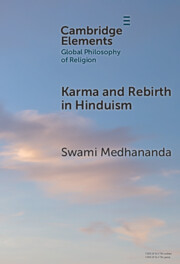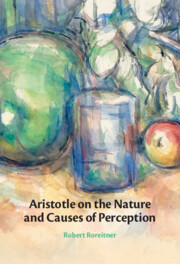Refine search
Actions for selected content:
165 results
Introduction
-
- Book:
- Galen on Human Physiology
- Published online:
- 28 July 2025
- Print publication:
- 02 October 2025, pp 1-21
-
- Chapter
- Export citation
Introduction
-
- Book:
- The Will in English Renaissance Drama
- Published online:
- 04 September 2025
- Print publication:
- 18 September 2025, pp 1-31
-
- Chapter
- Export citation
A FRAGMENT OF ARISTOTLE’S LOST EVDEMVS IN TERTULLIAN’S DE ANIMA
-
- Journal:
- The Classical Quarterly , First View
- Published online by Cambridge University Press:
- 11 September 2025, pp. 1-13
-
- Article
-
- You have access
- HTML
- Export citation

Karma and Rebirth in Hinduism
-
- Published online:
- 08 August 2025
- Print publication:
- 21 August 2025
-
- Element
- Export citation
Chapter 5 - Body, Mind, Soul, and Self
-
-
- Book:
- The Cambridge Companion to Marcus Aurelius' <i>Meditations</i>
- Published online:
- 02 July 2025
- Print publication:
- 17 July 2025, pp 82-108
-
- Chapter
- Export citation
Chapter 3 - Soul’s Self-Motion and Immortality
-
- Book:
- Proclus on Aristotle on Plato
- Published online:
- 05 June 2025
- Print publication:
- 19 June 2025, pp 99-136
-
- Chapter
-
- You have access
- Open access
- HTML
- Export citation
Chapter 2 - The Relationship of the Unmoved Mover and the Self-Mover
-
- Book:
- Proclus on Aristotle on Plato
- Published online:
- 05 June 2025
- Print publication:
- 19 June 2025, pp 67-98
-
- Chapter
-
- You have access
- Open access
- HTML
- Export citation
Chapter 5 - The Passivity of Perception and the Impassive Soul
-
- Book:
- Aristotle on the Nature and Causes of Perception
- Published online:
- 01 May 2025
- Print publication:
- 22 May 2025, pp 134-164
-
- Chapter
-
- You have access
- Open access
- HTML
- Export citation
Chapter 4 - The Flesh and Bones of Perception
-
- Book:
- Aristotle on the Nature and Causes of Perception
- Published online:
- 01 May 2025
- Print publication:
- 22 May 2025, pp 100-133
-
- Chapter
-
- You have access
- Open access
- HTML
- Export citation
Chapter 6 - Perception as a Discriminative Activity
-
- Book:
- Aristotle on the Nature and Causes of Perception
- Published online:
- 01 May 2025
- Print publication:
- 22 May 2025, pp 165-197
-
- Chapter
-
- You have access
- Open access
- HTML
- Export citation
Introduction
-
- Book:
- Aristotle on the Nature and Causes of Perception
- Published online:
- 01 May 2025
- Print publication:
- 22 May 2025, pp 1-23
-
- Chapter
-
- You have access
- Open access
- HTML
- Export citation
Aesara on human nature: the tripartition of the soul revisited
-
- Journal:
- The Journal of Hellenic Studies , First View
- Published online by Cambridge University Press:
- 13 May 2025, pp. 1-15
-
- Article
- Export citation
Life-world: Beyond Fukushima and Minamata
-
- Journal:
- Asia-Pacific Journal / Volume 10 / Issue 42 / October 2012
- Published online by Cambridge University Press:
- 07 May 2025, e2
-
- Article
-
- You have access
- Open access
- Export citation
Life-world: Beyond Fukushima and Minamata 「いのちの世界」: フクシマとミナマタを超えて
-
- Journal:
- Asia-Pacific Journal / Volume 11 / Issue S10 / January 2013
- Published online by Cambridge University Press:
- 07 May 2025, pp. 40-67
-
- Article
-
- You have access
- Open access
- Export citation

Aristotle on the Nature and Causes of Perception
-
- Published online:
- 01 May 2025
- Print publication:
- 22 May 2025
-
- Book
-
- You have access
- Open access
- Export citation
7. - Peter of John Olivi (d. 1298), Questions on the Sentences, book II, q. 54 (excerpts):
-
- Book:
- Medieval Philosophical Writings on the Powers of the Soul
- Published online:
- 10 April 2025
- Print publication:
- 17 April 2025, pp 122-144
-
- Chapter
- Export citation
4. - Henry of Ghent (d. 1293), Quodlibet III, q. 14 (excerpts):
-
- Book:
- Medieval Philosophical Writings on the Powers of the Soul
- Published online:
- 10 April 2025
- Print publication:
- 17 April 2025, pp 72-95
-
- Chapter
- Export citation
8. - John Duns Scotus (d. 1308), Commentary on the Sentences (Reportatio A), book II, d. 16:
-
- Book:
- Medieval Philosophical Writings on the Powers of the Soul
- Published online:
- 10 April 2025
- Print publication:
- 17 April 2025, pp 145-166
-
- Chapter
- Export citation
9. - James of Viterbo (d. 1308), Quodlibet I, q. 7, doubt 1:
-
- Book:
- Medieval Philosophical Writings on the Powers of the Soul
- Published online:
- 10 April 2025
- Print publication:
- 17 April 2025, pp 167-187
-
- Chapter
- Export citation
11. - William Ockham (d. 1347), Commentary on the Sentences (Reportatio), book II, q. 20
-
- Book:
- Medieval Philosophical Writings on the Powers of the Soul
- Published online:
- 10 April 2025
- Print publication:
- 17 April 2025, pp 210-231
-
- Chapter
- Export citation
